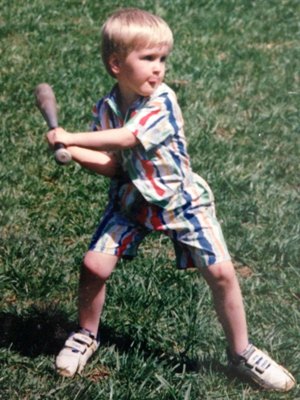
Editor’s Note: Twenty-five-year old Mossy Oak Pro David Buchanan from Atlanta, Georgia, is living every young baseball player’s dream. He's a starting pitcher for the Philadelphia Phillies professional baseball team. He made his debut in the Major Leagues on May 24, 2014, after signing a contract to play in the Philadelphia Phillies program in 2010.
I started pitching when I was 7-years old and pitched all the way through elementary school, high school and college. I've also played right field, center field and a little bit of infield. In high school, I was a pretty good hitter and batted clean-up. My batting average in high school was about .340. When I graduated from high school, I decided to go to Chipola College, because the school had a great baseball team. Many of their baseball players had been drafted into the pros. My goal was to go to college for a year or two and then sign to play professional baseball. Throughout my first year at Chipola College my pitching really improved. I stayed another year, and my pitching improved even more. I got drafted in the sixth round by the New York Mets in 2009. However, due to problems with contract negotiations, I didn’t sign my contract with the Mets.
After I finished junior college, I got a scholarship to play with Georgia State, a school close to my home and family. Too, my sister was in school there. I could spend more time with my sister and the rest of my family, if I took that scholarship. I pitched at Georgia State from 2009 to 2010. Then, I signed a professional baseball contract in 2010. While at Georgia State, I met with several big league scouts and talked about what they saw in me, and what my future could be in Major League baseball. At that time, the Philadelphia Phillies was the winningest team in Major League baseball. I thought signing with their team was one of the best places I could go to grow as a baseball player. I was way more than excited to be drafted by them. My family always was very supportive and knew that playing professional baseball was my dream. So, they were excited when I signed with Philadelphia. I don’t get to brag very often, but I did get four hits last season, and I'm really practicing a lot to improve as a batter.
 I'm often asked what’s going on between me and the catcher before I throw the pitch. People see a lot of signaling, moves and motion between me and the catcher, and we’re talking with each other without using words. The catcher and I do have many subliminal messages going on between us and a lot of signs and signals. The catcher has a great deal of information about the batter. Since he's close to the batter, he may see, hear or know something about that batter that makes him think a certain pitch is the one I need to throw. I'm also studying that batter. Sometimes, I’m telling the catcher by signs and signals what pitch I think I ought to throw. If we have a disagreement, often the catcher will call time out, and he’ll come out to the mound and talk to me. My catcher is Carlos Ruiz, who’s been catching 8 or 9 years in the big leagues. He has a lot of experience with just about every batter I face. He knows their tendencies, and he knows the pitches that are hard for the batter to hit. Over that 8 or 9 years, he's probably studied about 90 percent of the batters I’ll have to pitch to, so, when I go out to pitch, I have a lot of confidence in his ability to call a pitch for each batter. Knowing how good Carlos is at his job takes a lot of pressure off me, because I can depend on him to give me the right signal, for the right pitch, for each batter I face. When Carlos calls for a pitch, and I don’t want to throw that pitch to the batter, I’ll nod my head “No,” and he’ll call for another pitch. If I shake that second pitch off, I have the prerogative to throw the pitch I want to throw to that batter. Now having said that, I rarely shake off Carlos, because he and I take a lot of pride in being on the same page (having the same idea) of what pitch I need to throw to each batter each time I pitch to him.
I'm often asked what’s going on between me and the catcher before I throw the pitch. People see a lot of signaling, moves and motion between me and the catcher, and we’re talking with each other without using words. The catcher and I do have many subliminal messages going on between us and a lot of signs and signals. The catcher has a great deal of information about the batter. Since he's close to the batter, he may see, hear or know something about that batter that makes him think a certain pitch is the one I need to throw. I'm also studying that batter. Sometimes, I’m telling the catcher by signs and signals what pitch I think I ought to throw. If we have a disagreement, often the catcher will call time out, and he’ll come out to the mound and talk to me. My catcher is Carlos Ruiz, who’s been catching 8 or 9 years in the big leagues. He has a lot of experience with just about every batter I face. He knows their tendencies, and he knows the pitches that are hard for the batter to hit. Over that 8 or 9 years, he's probably studied about 90 percent of the batters I’ll have to pitch to, so, when I go out to pitch, I have a lot of confidence in his ability to call a pitch for each batter. Knowing how good Carlos is at his job takes a lot of pressure off me, because I can depend on him to give me the right signal, for the right pitch, for each batter I face. When Carlos calls for a pitch, and I don’t want to throw that pitch to the batter, I’ll nod my head “No,” and he’ll call for another pitch. If I shake that second pitch off, I have the prerogative to throw the pitch I want to throw to that batter. Now having said that, I rarely shake off Carlos, because he and I take a lot of pride in being on the same page (having the same idea) of what pitch I need to throw to each batter each time I pitch to him.
Many times when my catcher comes out to talk to me, he’ll ask me how I'm feeling. Then he’ll say, “Settle down. Take some deep breaths. We’ll get this next batter out.” Most of the time when the catcher comes out to talk to the pitcher, especially if the pitcher has had a couple of batters hit the pitches he's throwing, the catcher comes out to calm the pitcher down, encourage him and let the pitcher know he still believes in him and his pitches. Sometimes when the catcher comes to the mound, he’ll say something silly to make me laugh or to help me to relax. Then, I can gather myself up and be ready to make the next pitch, but that rarely ever happens. At this point in my career, I rely heavily on my catcher’s knowledge of each batter, since he knows each batter much, much better than I do. He has proven success on calling the right pitch for each batter I face. Usually, he's got a good idea of how to get each batter out. The relationship between the pitcher and the catcher is the strongest partnership on a baseball team. Each one depends on the other to be successful.
For more about David Buchanan and the Philadelphia Phillies, go to philadelphia.phillies.mlb.com.
Day 3: David Buchanan’s Greatest Baseball Game for the Phillies
Tomorrow: The Philadelphia Phillies David Buchanan Says Hunting Is His Escape



























